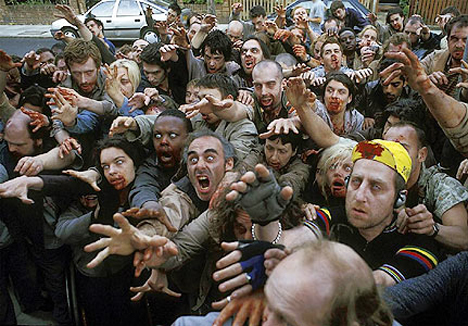ZOMBIE PREPPERS – Using zombies to teach science and medicine
 With my colleague Greg Tinkler, I spent an afternoon last week at a local public library talking to kids about zombies:
With my colleague Greg Tinkler, I spent an afternoon last week at a local public library talking to kids about zombies:
The Zombie Apocalypse is coming. Will you be ready? University of Iowa epidemiologist Dr. Tara Smith will talk about how a zombie virus might spread and how you can prepare. Get a list of emergency supplies to go home and build your own zombie kit, just in case. Find out what to do when the zombies come from neuroscientist Dr. Greg Tinkler. As a last resort, if you can’t beat them, join them. Disguise yourself as a zombie and chow down on brrraaaaiiins, then go home and freak out your parents.
Why zombies? Obviously they’re a hot topic right now, particularly with the ascendance of The Walking Dead. They’re all over ComicCon. There are many different versions so the “rules” regarding zombies are flexible, and they can be used to teach all different kinds of scientific concepts–and more importantly, to teach kids how to *think* about translating some of this knowledge into practice (avoiding a zombie pandemic, surviving one, etc.) We ended up with about 30 people there: about 25 kids (using the term loosely, they ranged in age from maybe age 10 to 18 or so) and a smattering of adults. I covered the basics of disease transmission, then discussed how it applied to a potential “zombie germ,” while Greg explained how understanding the neurobiology of zombies can aid in fleeing from or killing them. The kids were involved, asked great questions, and even taught both of us a thing or two (and gave us additional zombie book recommendations!)
For infectious diseases, there are all kinds of literature-backed scenarios that can get kids discussing germs and epidemiology. People can die and reanimate as zombies, or they can just turn into infected “rage monsters” who try to eat you without actually dying first. They can have an extensive incubation period, or they can zombify almost immediately. Each situation calls for different types of responses–while the “living” zombies may be able to be killed in a number of different ways, for example, reanimated zombies typically can only be stopped by destroying the brains. Discussing these situations allows the kids to use critical thinking skills, to plan attacks and think through choice of weapons, escape routes and vehicles, and consider what they might need in a survival kit.
Likewise, zombie microbes can be spread through biting, through blood, through the air, by fomites or water, even by mosquitoes in some books. Agents can be viral, bacterial, fungal, prions or parasitic insect larvae (or combinations of those). Mulling on these different types of transmission issues and asking simple questions:
“How would you protect yourself if infection was spread through the air versus only spread by biting?”
“How well would isolation of infected people work if the incubation period is very long versus very short?”
“Why might you want to thoroughly wash your zombie-killing arrows before using them to kill squirrels, which you will then eat?” (ahem, Daryl)
can open up avenues of discussion into scientific issues that the kids don’t even realize they’re talking about (pandemic preparedness, for one). And the great thing is that these kids are *already experts* on the subject matter. They don’t have to learn about the epidemiology of a particular microbe to understand disease transmission and prevention, because they already know more than most of the adults do on the epidemiology of zombie diseases–the key is to get them to use that knowledge and broaden their thinking into various “what if” situations that they’re able to talk out and put pieces together.
It can be scary going to talk to kids. Since this was a new program, we didn’t know if anyone would even show up, or how it would go over. Greg brought a watermelon for some weapons demonstrations (household tools only–a screwdriver, hammer and a crowbar, no guns or Samurai swords) which was a big hit. Still, I realize many scientists are more comfortable talking with their peers than with 13-year-olds. Talking about something a bit ridiculous, like an impending zombie apocalypse, can lessen anxiety because it takes quite a lot of effort to be boring with that type of subject matter; it’s entertaining; and kids will listen. And after all, what you don’t know, might eat you.